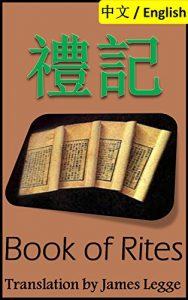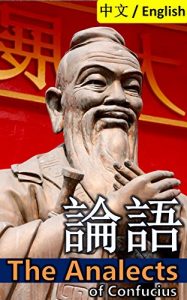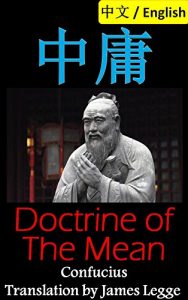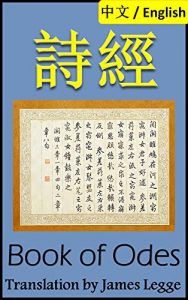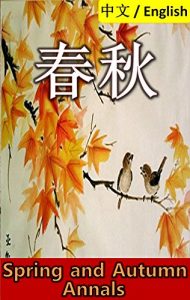This complete edition of The Book of Rites (Liji) features both English and Chinese side-by-side for easy reference and bilingual support. The sections are linked and organized for easy reading.
The Book of Rites or Liji, literally the Record of Rites, is a collection of texts describing the social forms, administration, and ceremonial rites of the Zhou dynasty as they were understood in the Warring States and the early Han periods. The Book of Rites, along with the Rites of Zhou (Zhouli) and the Book of Etiquette and Rites (Yili), which are together known as the "Three Li (San li)," constitute the ritual (li) section of the Five Classics which lay at the core of the traditional Confucian canon. As a core text of the Confucian canon, it is also known as the Classic of Rites (Lijing), which some scholars believe was the original title. Some sections consist of definitions of ritual terms, particularly those found in the Etiquette and Ceremonial, while others contain details of the life and teachings of Confucius.
Confucius described Li as all traditional forms that provided a standard of conduct. Li literally means "rites" but it can also be used to refer to "ceremonial" or "rules of conduct". The term has come to generally be associated with "good form" or "decorum". The ideas of li were thought to become closely associated with human nature, ethics, and social order as the population integrated li into their lives. Li was beneficial to society because it forced people to recognize and fulfill their responsibilities toward others.
*This edition includes a Classical Chinese Quick Study Guide.
《礼记》,儒学经典之一,所收文章是孔子的学生及戰國时期儒学学者的作品。汉朝学者戴德将汉初刘向收集的130篇综合简化,一共得85篇,称为《大戴礼记》,后来其姪戴圣又将「大戴礼记」简化删除,得46篇,再加上《月令》、《明堂位》和《乐记》,一共49篇,称为《小戴礼记》。「大戴礼记」至隋、唐時期已散逸大半,現僅留傳39篇,而「小戴礼记」則成为今日通行的《礼记》。
汉景帝时魯恭王劉餘初好治宮室而壞孔子宅,得古《礼》五十七篇於壞壁之中,其中十七篇与《仪礼》相同,《奔丧》、《投壶》见于另外四十篇中,礼家将其录于《礼记》之中,得以流传,而其余篇章,因为藏之秘府,世人难得一见,后来散逸不传,称为“逸《礼》”。
朱熹撰有《朱子家禮》一书,他認為“《禮記》只是解《儀禮》”。阮元在《书东莞陈氏〈学蔀通辩〉后》说:“朱子中年讲理,固已精实,晚年讲礼,尤耐繁难,诚有见乎理必出于礼也。古今所以治天下者礼也,五伦皆礼……且如殷尚白,周尚赤,礼也。使居周而有尚白者,若以非礼折之,则人不能争,以非理折之,则不能无争矣。故理必附乎礼以行,空言理,则可彼可此之邪说起矣。”
《礼记》全書以散文撰成,一些篇章饒具文学价值。有的用短小的生动故事阐明某一道理,有的气势磅礴、结构谨严,有的言简意赅、意味隽永,有的擅长心理描写和刻画,书中还收有大量富有哲理的格言、警句,精辟而深刻。
《礼记》不仅是一部描写规章制度的书,也是一部关于仁义道德的教科书。其中最有名篇章,有《大學》、《中庸》、《禮運》(首段)等。《禮運》首段是孔子与子游的对话,又稱為《禮運·大同》篇,大同二字常用作理想境界的代名詞,不少地名亦取用此二字。
Table of Contents:
曲禮上 – Summary of the Rules of Propriety 1
曲禮下 - Summary of the Rules of Propriety 2
檀弓上 - Tan Gong I
檀弓下 - Tan Gong II
王制 – Royal Regulations
月令 – Governing in the Different Months
曾子問 – The Questions of Zengzi
文王世子 – King Wen as Son and Heir
禮運 – Ceremonial Usages; origins, development, intentions
禮器 – Rites in the formation of Character
郊特牲 – Single Victim at the border Sacrifices
內則 – Pattern of the Family
玉藻 – Jade-bead Pendants of the Royal Cap
明堂位 – Places in the Hall of Distinction
喪服小記 – Small Matters in Mourning Dress
大傳 – The Great Treatise
少儀 – Smaller Rules of Demeanour
學記 – Record on the Subject of Education
樂記 – Record of Music
雜記上 – Miscellaneous Records 1
雜記下 - Miscellaneous Records 2
喪大記 – Greater Record of Mourning Rites
祭法 – Law of Sacrifices
祭義 – Meaning of Sacrifices
祭統 – Summary Account of Sacrifices
經解 – Different Teaching of the Different Kings
哀公問 – Questions of Duke Ai
仲尼燕居 – Zhongni at Home at Ease
孔子閒居 – Confucius at Home at Leisure
坊記 – Record of the Dykes
中庸 – State of Equilibrium and Harmony
表記 – Record on Example
緇衣 – Black Robes
奔喪 – Rules on Hurrying to the Mourning Rites
問喪 – Questions about Mourning Rites
服問 – Questions about the Mourning Dress
間傳 – Subsidiary points in Mourning Usages
三年問 – Questions about Three Year Mourning
深衣 – Long Dress in one piece
投壺 – Game of Pitch Pot
儒行 – Conduct of the Scholar
大學 – Great Learning
冠義 – Meaning of the Ceremony of Capping
昏義 – Meaning of the Marriage Ceremony
鄉飲酒義 – Meaning of the Drinking Festivity
射義 – Meaning of the Archery Ceremony
燕義 – Meaning of the Banquet
聘義 – Meaning of the Miss
The Book of Rites or Liji, literally the Record of Rites, is a collection of texts describing the social forms, administration, and ceremonial rites of the Zhou dynasty as they were understood in the Warring States and the early Han periods. The Book of Rites, along with the Rites of Zhou (Zhouli) and the Book of Etiquette and Rites (Yili), which are together known as the "Three Li (San li)," constitute the ritual (li) section of the Five Classics which lay at the core of the traditional Confucian canon. As a core text of the Confucian canon, it is also known as the Classic of Rites (Lijing), which some scholars believe was the original title. Some sections consist of definitions of ritual terms, particularly those found in the Etiquette and Ceremonial, while others contain details of the life and teachings of Confucius.
Confucius described Li as all traditional forms that provided a standard of conduct. Li literally means "rites" but it can also be used to refer to "ceremonial" or "rules of conduct". The term has come to generally be associated with "good form" or "decorum". The ideas of li were thought to become closely associated with human nature, ethics, and social order as the population integrated li into their lives. Li was beneficial to society because it forced people to recognize and fulfill their responsibilities toward others.
*This edition includes a Classical Chinese Quick Study Guide.
《礼记》,儒学经典之一,所收文章是孔子的学生及戰國时期儒学学者的作品。汉朝学者戴德将汉初刘向收集的130篇综合简化,一共得85篇,称为《大戴礼记》,后来其姪戴圣又将「大戴礼记」简化删除,得46篇,再加上《月令》、《明堂位》和《乐记》,一共49篇,称为《小戴礼记》。「大戴礼记」至隋、唐時期已散逸大半,現僅留傳39篇,而「小戴礼记」則成为今日通行的《礼记》。
汉景帝时魯恭王劉餘初好治宮室而壞孔子宅,得古《礼》五十七篇於壞壁之中,其中十七篇与《仪礼》相同,《奔丧》、《投壶》见于另外四十篇中,礼家将其录于《礼记》之中,得以流传,而其余篇章,因为藏之秘府,世人难得一见,后来散逸不传,称为“逸《礼》”。
朱熹撰有《朱子家禮》一书,他認為“《禮記》只是解《儀禮》”。阮元在《书东莞陈氏〈学蔀通辩〉后》说:“朱子中年讲理,固已精实,晚年讲礼,尤耐繁难,诚有见乎理必出于礼也。古今所以治天下者礼也,五伦皆礼……且如殷尚白,周尚赤,礼也。使居周而有尚白者,若以非礼折之,则人不能争,以非理折之,则不能无争矣。故理必附乎礼以行,空言理,则可彼可此之邪说起矣。”
《礼记》全書以散文撰成,一些篇章饒具文学价值。有的用短小的生动故事阐明某一道理,有的气势磅礴、结构谨严,有的言简意赅、意味隽永,有的擅长心理描写和刻画,书中还收有大量富有哲理的格言、警句,精辟而深刻。
《礼记》不仅是一部描写规章制度的书,也是一部关于仁义道德的教科书。其中最有名篇章,有《大學》、《中庸》、《禮運》(首段)等。《禮運》首段是孔子与子游的对话,又稱為《禮運·大同》篇,大同二字常用作理想境界的代名詞,不少地名亦取用此二字。
Table of Contents:
曲禮上 – Summary of the Rules of Propriety 1
曲禮下 - Summary of the Rules of Propriety 2
檀弓上 - Tan Gong I
檀弓下 - Tan Gong II
王制 – Royal Regulations
月令 – Governing in the Different Months
曾子問 – The Questions of Zengzi
文王世子 – King Wen as Son and Heir
禮運 – Ceremonial Usages; origins, development, intentions
禮器 – Rites in the formation of Character
郊特牲 – Single Victim at the border Sacrifices
內則 – Pattern of the Family
玉藻 – Jade-bead Pendants of the Royal Cap
明堂位 – Places in the Hall of Distinction
喪服小記 – Small Matters in Mourning Dress
大傳 – The Great Treatise
少儀 – Smaller Rules of Demeanour
學記 – Record on the Subject of Education
樂記 – Record of Music
雜記上 – Miscellaneous Records 1
雜記下 - Miscellaneous Records 2
喪大記 – Greater Record of Mourning Rites
祭法 – Law of Sacrifices
祭義 – Meaning of Sacrifices
祭統 – Summary Account of Sacrifices
經解 – Different Teaching of the Different Kings
哀公問 – Questions of Duke Ai
仲尼燕居 – Zhongni at Home at Ease
孔子閒居 – Confucius at Home at Leisure
坊記 – Record of the Dykes
中庸 – State of Equilibrium and Harmony
表記 – Record on Example
緇衣 – Black Robes
奔喪 – Rules on Hurrying to the Mourning Rites
問喪 – Questions about Mourning Rites
服問 – Questions about the Mourning Dress
間傳 – Subsidiary points in Mourning Usages
三年問 – Questions about Three Year Mourning
深衣 – Long Dress in one piece
投壺 – Game of Pitch Pot
儒行 – Conduct of the Scholar
大學 – Great Learning
冠義 – Meaning of the Ceremony of Capping
昏義 – Meaning of the Marriage Ceremony
鄉飲酒義 – Meaning of the Drinking Festivity
射義 – Meaning of the Archery Ceremony
燕義 – Meaning of the Banquet
聘義 – Meaning of the Miss
